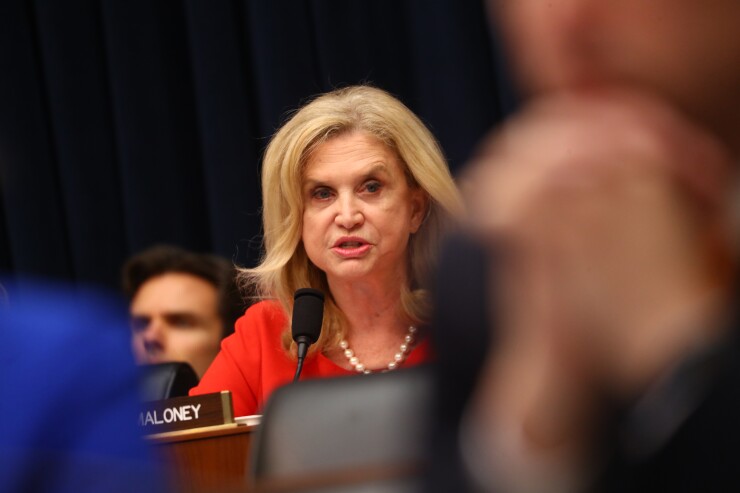WASHINGTON — In the latest example of pressure on banks to rein in overdraft fees, a senior House Democrat has reintroduced legislation to restrict the charges.
Rep. Carolyn Maloney, D-N.Y., held a press conference Wednesday to tout the Overdraft Protection Act, which would restrict the number of times banks can collect the fees and is also intended to ensure that charges are reasonable.
“The Overdraft Protection Act will keep money in people's pockets,” Maloney said.

The legislation would prohibit banks from charging a customer more than one overdraft fee per month, and limit the total number per customer to six each year. The bill would also require that any overdraft fees be “reasonable and proportional" to the amount of the overdraft.
Maloney said at the press conference that the legislation would also prevent banks from reordering customers’ transactions, which would prevent avoidable overdraft fees.
“In order to maximize profits from overdraft fees, some banks are reordering transactions," Maloney said. "For example, a bank will process your mortgage payment first, and then process lower charges, pushing you into overdraft. So rather than paying a one-time overdraft fee on your mortgage payment, the next five or 10 charges each incur individual overdraft fees. It is manipulative and predatory.”
In recent months, Democratic members of Congress have criticized banks in connection with overdraft fees charged during the coronavirus pandemic.
Maloney's legislation is backed by Consumer Reports, the National Consumer Law Center, the U.S. Public Interest Research Group and the Center for Responsible Lending.
“These [overdraft] fees make banks, the very institutions we trust to safeguard our funds, a hostile place for many of our nation's most vulnerable financial households to put their money,” said Ashley Harrington, federal advocacy director at the Center for Responsible Lending. “It's clearly unacceptable, and it should be illegal. We need reasonable rules of the road that ensure banks cannot systematically financially devastate their own customers.”
In recent months,
Industry representatives said in response to the bill's reintroduction that some bank customers want to be able to overdraw their accounts in some situations.
“Many consumers want the option to overdraft to avoid a late fee, a negative credit report hit, or missing an important bill,” Sean Oblack, a spokesperson for the Bank Policy Institute, which represents many of the nation's largest banks, said in a statement. “Many banks offer no-overdraft, low-cost accounts for those who don’t want the option.”
Richard Hunt, president and CEO of the Consumer Bankers Association, indicated that Maloney’s legislation would result in consumer harm.
“Restricting access to overdraft, as this legislation calls for, would only drive consumers to predatory payday lenders or pawn shops — neither of which provide the same safety and soundness as well-regulated and well-supervised banks,” he said.





